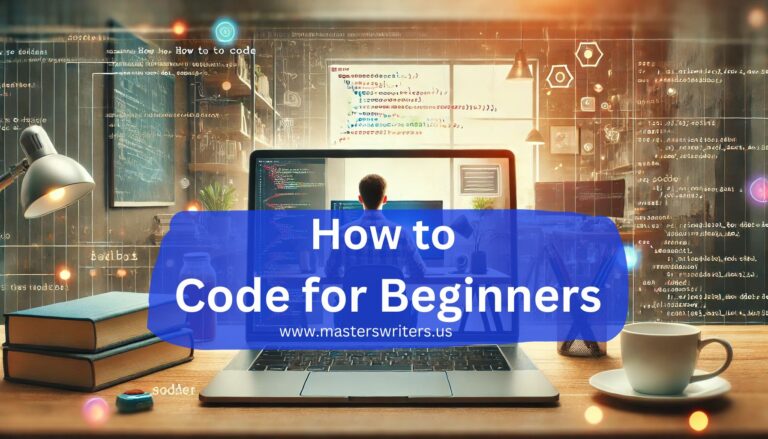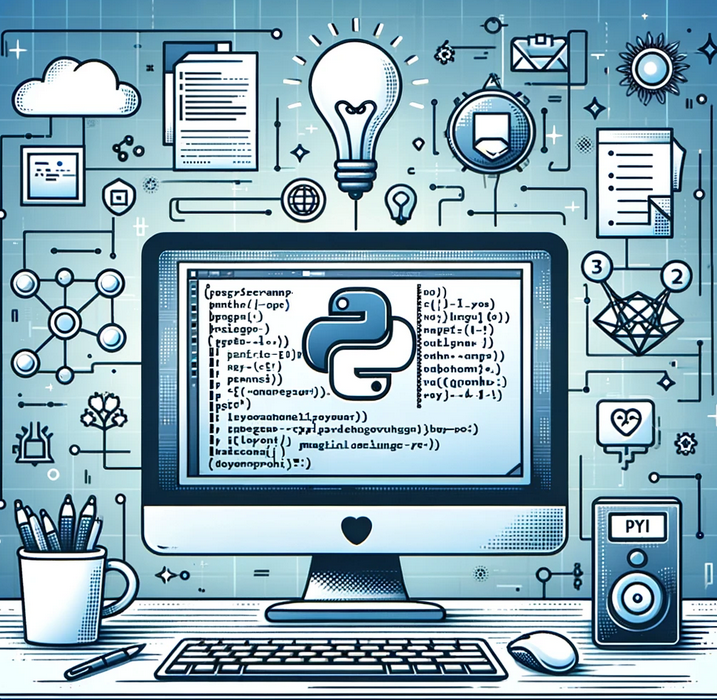Lifestyle
How to Code for Beginners: Your Ultimate Guide to Writing Code


Coding is one of the most in-demand skills in today’s digital world. According to the U.S. Bureau of Labor Statistics, jobs for software developers, quality assurance analysts, and testers are projected to grow 17% from 2023 to 2033, significantly faster than the average for all occupations. That means over 327,900 new job opportunities, offering a median annual salary of $130,160—a lucrative and stable career path for aspiring programmers like you.
The tech industry is evolving at an incredible pace, with advancements in AI, blockchain, cybersecurity, and virtual reality reshaping the job market. Businesses are searching for problem-solving, tech-savvy professionals, and learning to code can be your gateway into this fast-growing industry.
Feeling excited but unsure how to start coding? Don’t worry! This guide will simplify the basics of coding, providing practical steps, beginner-friendly programming languages, and tips to help you start your coding journey with confidence. Let’s dive in!
What is Coding
Coding is the process of giving instructions to a computer using a programming language to create software, websites, apps, and more. It translates human logic into a format that machines can understand and execute, allowing automation and problem-solving. Essentially, coding is the foundation of all digital technology, from mobile apps to artificial intelligence.
At its core, coding involves writing step-by-step commands that tell a computer what to do, much like a recipe guides a chef. Different programming languages, such as Python, JavaScript, and C++, serve specific purposes, from web development to game design. Learning to code empowers individuals to build digital solutions, automate tasks, and innovate in various industries.
Feeling overwhelmed by schoolwork? Request, ” Do my assignments for me,” and our experts will take care of everything professionally and precisely.

Looking for Expert Help?
Let us handle your tasks while you focus on what matters most!
Why Learn to Code
Learning to code gives you access to the technology shaping the future. It enhances your ability to think logically, solve problems efficiently, and innovate in a digital world. Whether you’re interested in web development, artificial intelligence, or cybersecurity, coding opens the door to endless career opportunities.
But coding isn’t just for tech professionals—it’s a versatile skill. Want to develop your own app, create a website, or automate repetitive tasks? Coding is the foundation for all of it. Even if you don’t plan to work in tech, understanding code can improve productivity and streamline workflows in any industry.
The best part? You don’t need a computer science degree to start coding. Whether you’re a student exploring career options or an entrepreneur building your next big idea, coding is an accessible and valuable skill for everyone.
Benefits of Learning to Code for Beginners:
✅ High-demand skills with excellent salary potential and career growth.
✅ Flexibility to work remotely or freelance on projects you enjoy.
✅ Create apps, games, and digital tools to bring your ideas to life.
✅ Join a global coding community and contribute to open-source projects.
✅ Stay competitive in a world where automation and AI are transforming industries.
How to Get Started with Coding
Starting your coding journey may feel overwhelming, but breaking it down into simple steps makes it much easier. It’s all about understanding your motivation, choosing the right programming language, and setting up the necessary tools. Here’s a structured guide to help you take your first steps into coding with confidence.
- Define Your Purpose for Learning to Code
Before you dive in, ask yourself why you want to learn coding. Are you looking to build websites, develop mobile apps, analyze data, or pursue a career in tech? Maybe you’re just curious and want to explore something new. Identifying your goal will help you stay focused and motivated, especially when you encounter challenges.
For example:
- If you’re interested in web development, start with HTML, CSS, and JavaScript.
- If data science or automation intrigues you, Python is an excellent first choice.
- If you want to build mobile apps, learning Swift (for iOS) or Kotlin (for Android) is beneficial.
Many successful programmers began with curiosity and found rewarding careers. Write down your goals and refer back to them when you need motivation—it’ll help keep you on track!
- Choose the Right Programming Language
Not all programming languages are beginner-friendly, so selecting the right one is crucial. Here are a few great options to start with:
✅Python – One of the easiest to learn due to its simple syntax. Perfect for general programming, automation, and data science.
✅ JavaScript – Essential for web development, enabling interactive websites and front-end applications.
✅ HTML & CSS – While not traditional programming languages, they are must-haves for designing and structuring web pages.
✅ Scratch – A visual coding language designed for absolute beginners, particularly useful for kids or those who prefer a drag-and-drop approach.
If you’re unsure, Python is often the best choice because of its readability and versatility. Free platforms like Codecademy, freeCodeCamp, and W3Schools offer beginner-friendly courses tailored to specific programming languages.
- Set Up Your Coding Environment
Before writing your first line of code, setting up the right tools will make your learning experience smoother. Here’s what you need:
- Install a Code Editor: A good text editor is essential. Beginners often start with Visual Studio Code (VS Code), Sublime Text, or PyCharm for Python.
- Organize Your Projects: Keep your coding files structured in folders, making it easy to track your progress.
- Learn Basic Version Control: Platforms like Git and GitHub allow you to save and manage your projects, which is a valuable skill for any coder.
For instance, if you’re starting with Python, download Python from its official site and install VS Code. Within minutes, you’ll have everything ready to start writing your first program.
Think of this setup like preparing a workstation—once you have the right tools in place, you’re ready to start coding!
Pressed for time? Simply ask “Do my homework for me,” and let our experts handle the rest while you focus on what matters most.
5 Practical Steps on How to Code for Beginners
Learning to code might seem intimidating at first, but breaking it down into manageable steps makes the process much easier. Whether you want to build websites, create apps, or automate tasks, following these five practical steps will set you on the right path.
- Define Your Goal and Choose a Language
Before you start, identify your reason for learning to code. Do you want to become a web developer, game designer, data analyst, or AI specialist? Your goal will help you decide which programming language to learn first.
Here are some beginner-friendly programming languages based on different interests:
- Web development: HTML, CSS, JavaScript
- Data science & automation: Python
- Mobile app development: Swift (iOS) or Kotlin (Android)
- Game development: C# or Unity
If you’re unsure, Python is a great beginner language due to its easy-to-read syntax and versatility.
- Set Up Your Development Environment
Once you’ve chosen a language, it’s time to set up the right tools. This includes:
✅Installing a code editor – Popular options include Visual Studio Code (VS Code), Sublime Text, or PyCharm for Python.
✅ Organizing your projects – Keep your files in neat folders to track your progress.
✅ Learning basic version control – Platforms like Git and GitHub help you save and share your projects.
Having the right tools makes coding smoother and more enjoyable!
- Start with Small, Hands-On Projects
The best way to learn coding is by doing. Begin with small, practical projects to reinforce what you learn.
🔹 For web development – Build a simple webpage using HTML & CSS.
🔹 For Python beginners – Write a basic calculator or a program that asks for user input.
🔹 For JavaScript learners – Create an interactive button that changes color when clicked.
Platforms like freeCodeCamp, Codecademy, and W3Schools offer hands-on coding exercises to help you practice.
- Learn by Debugging and Experimenting
Coding is all about trial and error. When your code doesn’t work, don’t get discouraged—debugging is part of the learning process.
🔍 Common debugging tips:
- Read error messages carefully – They often tell you exactly what went wrong.
- Use print statements – Check what’s happening in your code at different steps.
- Search online – Websites like Stack Overflow and developer communities can help you find solutions.
Mistakes are learning opportunities—embrace them and keep experimenting!
- Join a Coding Community and Keep Practicing
Learning to code is more fun when you connect with others. Join online coding forums, Discord groups, or local coding meetups to get support and share progress.
💡 Great coding communities for beginners:
- GitHub – Share your projects and collaborate with others.
- Stack Overflow – Ask coding questions and get expert advice.
- Reddit’s r/learnprogramming – A great place for beginners to ask for help.
Most importantly, keep practicing! Coding is like a muscle—the more you use it, the stronger it gets.
More Coding Tips for Beginners
Now that you’ve covered the fundamentals of how to code, here are some additional tips to help you learn more effectively and improve your coding skills faster.
💡 Coding Tip | 📋 Description |
🔍 Understand Every Line | Instead of just copying and pasting, take the time to analyze how each line of code works. This deepens your understanding of programming logic. |
🐞 Learn to Debug | Bugs and errors are part of coding—don’t fear them! Instead, treat them as learning opportunities and practice troubleshooting. |
🚀 Start with Simple Projects | Build small projects like a calculator, to-do list, or basic webpage before jumping into complex applications. |
🧘 Take Breaks | Avoid burnout by following the Pomodoro technique or stepping away when stuck—sometimes, solutions come when you least expect them. |
🏆 Practice with Challenges | Websites like HackerRank, LeetCode, and Codewars offer fun coding challenges to sharpen your problem-solving skills. |
👀 Read & Refactor Code | Study open-source projects and try refactoring existing code to improve efficiency and readability. |
⏳ Be Consistent | Coding is a skill that improves with regular practice—even coding for 20–30 minutes daily can make a huge difference. |
🌍 Engage with the Community | Join forums like Stack Overflow, Reddit’s r/learnprogramming, or GitHub to seek guidance and collaborate on projects. |
Juggling coding tasks and asking yourself, “Who can do my essay?” Let us handle the writing while you focus on mastering tech.
To Wrap Up
Learning to code is an exciting journey that opens doors to endless possibilities, from building websites to developing AI-powered applications. By starting with the basics, practicing consistently, and leveraging online resources, you can gradually build your skills and confidence. Remember, every expert coder was once a beginner—so stay curious, embrace challenges, and keep experimenting. With dedication and patience, you’ll soon be creating amazing projects and unlocking new career opportunities!

Balancing Coding and Coursework?
Stay on top of your studies while honing your coding skills. Let our experts handle your assignments with ease!
FAQs
How to Code for Beginners?
Coding for beginners starts with choosing the right programming language, setting up a development environment, and practicing basic coding concepts. A good way to start is:
- Pick an easy-to-learn language like Python, JavaScript, or Scratch.
- Use free learning platforms such as Codecademy, freeCodeCamp, or W3Schools.
- Start with simple projects, like a basic calculator or a personal webpage.
- Debug your code, experiment, and learn from mistakes.
- Join coding communities like GitHub or Stack Overflow for guidance.
What are the 7 Steps of Coding?
The seven key steps in coding help you develop logical and functional programs:
- Define the Problem – Understand what the program needs to accomplish.
- Plan the Solution – Break the task into smaller, manageable steps.
- Choose a Programming Language – Select a suitable language based on your goal (e.g., Python for automation, JavaScript for web development).
- Write the Code – Use a code editor or IDE to implement your plan.
- Test and Debug – Run your program, find errors, and fix them.
- Refine and Optimize – Improve efficiency, readability, and performance.
- Deploy and Maintain – Publish your project and keep it updated.
What is the Golden Rule of Coding?
The Golden Rule of Coding is: “Write code for humans first, computers second.”
This means:
- Keep it simple and readable – Use clear naming conventions and comments.
- Avoid unnecessary complexity – Write efficient, clean code.
- Make it maintainable – Code should be easy to modify and debug.
Sources
Bureau of Labor Statistics, U.S. Department of Labor, Occupational Outlook Handbook, Software Developers, Quality Assurance Analysts, and Testers. Available at: https://www.bls.gov/ooh/computer-and-information-technology/software-developers.htm

